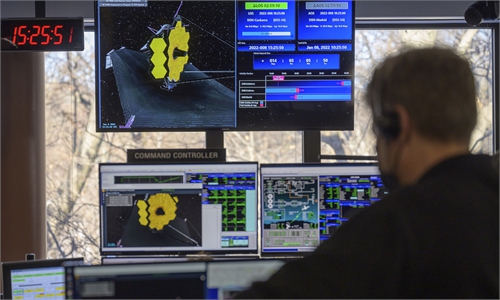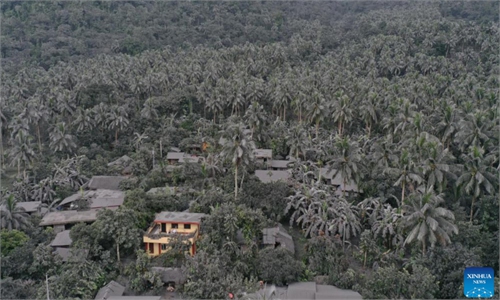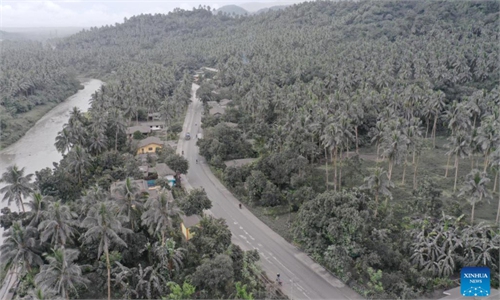Earth overdue for volcanic super eruption
Explosive pressure builds up over millions of years, new research finds
Large-scale volcanic eruptions started 100 kilometers underground over millions of years, a new research published in the latest edition of Nature has revealed.
With super eruptions expected once every 20,000 years, one could even be due as the last massive volcano to erupt occurred 26,000 years ago, said Professor Stephen Sparks, an experienced vulcanologist from the University of Bristol.
Sparks led an international research project in the Andes in northern Chile, where a number of massive volcanic eruptions happened many years ago, aimed at giving early warning and forecast for volcanic eruptions.
"These eruptions happened a long time ago in the Andes. We could look at the whole process of how the magmas are generated and how they erupt and we find these huge eruptions take millions of years. So they're very rare events, but there's a certain regularity of them erupting," Sparks told the Xinhua News Agency.
"We believe that reflects processes in the Earth which lead to periodic behavior in which large amounts of molten rock accumulated over very long periods of time, and then really quite rapidly in a geological sense, rise to the Earth's surface and erupt in one go," he said.
In the research, the researchers using radioactive isotopes dated tiny little crystals which were erupted from the volcano and showed that they are up to 2 or 3 million years older than the age of eruption itself.
"That's telling us that the processes which lead up to these enormous eruptions is a very long process, and can easily be millions of year," Sparks said.
"It's somewhat unexpected. What we found was that before you really got much volcanism at all, magmas had been stored underground. They intruded into the shallow part of the crust, maybe 10 or 20 kilometers deep, and accumulated there. And they had to build up enough energy for these enormous eruptions. And that seems to have taken a few million years to do that," he said.
The research in the Andes was part of a project supporting the mining company BHP who were exploring for copper. Deep drills through volcanic rocks in the northern part of Chile were taken as part of the exploration program.
Sparks said what was now of great interest is how often eruptions of that scale happen.
"We've been studying the rates of these eruptions around the Earth and we find that roughly there's one every 20,000 years. So they're pretty unlikely to happen during any human's lifespan. The last one we know about was in New Zealand about 26,000 years ago," he said.
Sparks said there are about 1,500 volcanoes which are known to be historically active on Earth, with about 50 super eruption volcanoes.
On the impact of super volcano eruptions, Sparks said that locally they might damage areas of hundreds of thousands of square kilometers, either through big fast moving flows or a massive amount of volcanic ash falling on the ground.
Sparks said the new research will help experts better understand the causes of episodic volcanism.
With super eruptions expected once every 20,000 years, one could even be due as the last massive volcano to erupt occurred 26,000 years ago, said Professor Stephen Sparks, an experienced vulcanologist from the University of Bristol.
Sparks led an international research project in the Andes in northern Chile, where a number of massive volcanic eruptions happened many years ago, aimed at giving early warning and forecast for volcanic eruptions.
"These eruptions happened a long time ago in the Andes. We could look at the whole process of how the magmas are generated and how they erupt and we find these huge eruptions take millions of years. So they're very rare events, but there's a certain regularity of them erupting," Sparks told the Xinhua News Agency.
"We believe that reflects processes in the Earth which lead to periodic behavior in which large amounts of molten rock accumulated over very long periods of time, and then really quite rapidly in a geological sense, rise to the Earth's surface and erupt in one go," he said.
In the research, the researchers using radioactive isotopes dated tiny little crystals which were erupted from the volcano and showed that they are up to 2 or 3 million years older than the age of eruption itself.
"That's telling us that the processes which lead up to these enormous eruptions is a very long process, and can easily be millions of year," Sparks said.
"It's somewhat unexpected. What we found was that before you really got much volcanism at all, magmas had been stored underground. They intruded into the shallow part of the crust, maybe 10 or 20 kilometers deep, and accumulated there. And they had to build up enough energy for these enormous eruptions. And that seems to have taken a few million years to do that," he said.
The research in the Andes was part of a project supporting the mining company BHP who were exploring for copper. Deep drills through volcanic rocks in the northern part of Chile were taken as part of the exploration program.
Sparks said what was now of great interest is how often eruptions of that scale happen.
"We've been studying the rates of these eruptions around the Earth and we find that roughly there's one every 20,000 years. So they're pretty unlikely to happen during any human's lifespan. The last one we know about was in New Zealand about 26,000 years ago," he said.
Sparks said there are about 1,500 volcanoes which are known to be historically active on Earth, with about 50 super eruption volcanoes.
On the impact of super volcano eruptions, Sparks said that locally they might damage areas of hundreds of thousands of square kilometers, either through big fast moving flows or a massive amount of volcanic ash falling on the ground.
Sparks said the new research will help experts better understand the causes of episodic volcanism.



